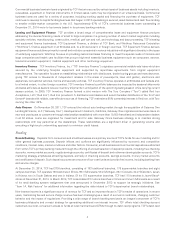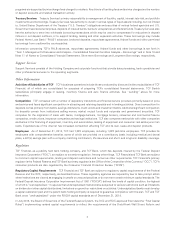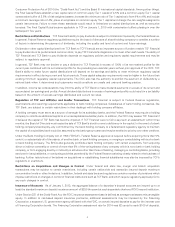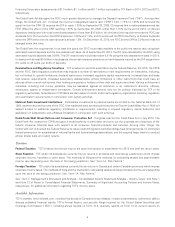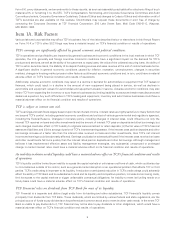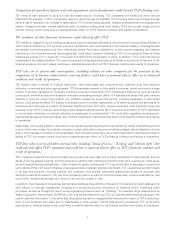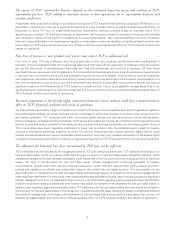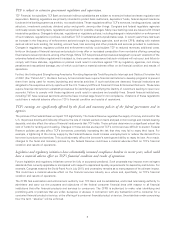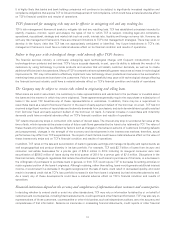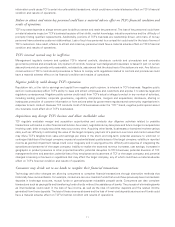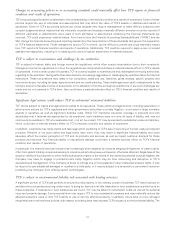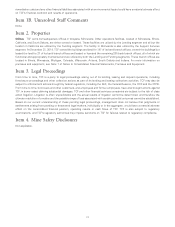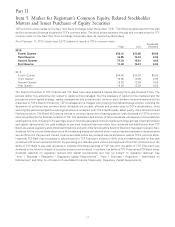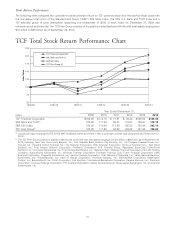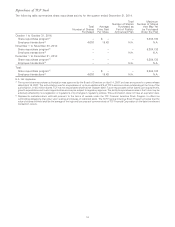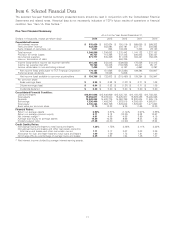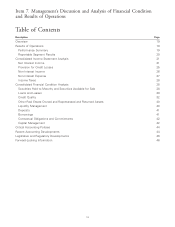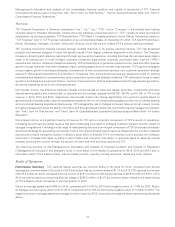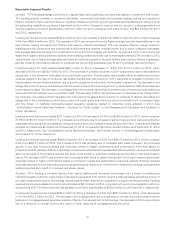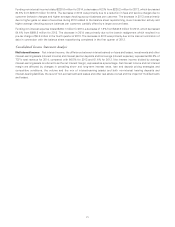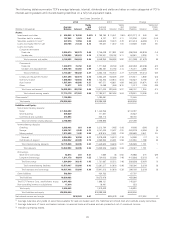TCF Bank 2014 Annual Report Download - page 25
Download and view the complete annual report
Please find page 25 of the 2014 TCF Bank annual report below. You can navigate through the pages in the report by either clicking on the pages listed below, or by using the keyword search tool below to find specific information within the annual report.Changes in accounting policies or in accounting standards could materially affect how TCF reports its financial
condition and results of operations.
TCF’s accounting policies are fundamental to the understanding of its financial condition and results of operations. Some of these
policies require the use of estimates and assumptions that may affect the value of TCF’s assets or liabilities and results of
operations. Some of TCF’s accounting policies are critical because they require management to make difficult, subjective and
complex judgments about matters that are inherently uncertain and because materially different amounts would be reported if
different estimates or assumptions were used. If such estimates or assumptions underlying the financial statements are
incorrect, TCF could experience material losses. From time to time the Financial Accounting Standards Board (‘‘FASB’’) and the
SEC change the financial accounting and reporting standards or the interpretation of those standards that govern the preparation
of TCF’s financial statements. These changes are beyond TCF’s control, can be difficult to predict and could materially impact
how TCF reports its financial condition and results of operations. Additionally, TCF could be required to apply a new or revised
standard retrospectively, resulting in it restating prior period financial statements in material amounts.
TCF is subject to examinations and challenges by tax authorities.
TCF is subject to federal, state, and foreign income tax regulations, which often require interpretation due to their complexity.
Changes in income tax regulations or in how the regulations are interpreted could have a material adverse effect on TCF’s results
of operations. In the normal course of business, TCF is routinely subject to examinations and challenges from taxing authorities,
regarding its tax positions. Taxing authorities have become increasingly aggressive in challenging tax positions taken by financial
institutions. These tax positions may relate to tax compliance, sales and use, franchise, gross receipts, payroll, property and
income tax issues, including tax base, apportionment and tax credit planning. These challenges may result in adjustments to the
timing or amount of taxable income or deductions, or the allocation of income among tax jurisdictions. If any such challenges are
made and are not resolved in TCF’s favor, they could have a material adverse effect on TCF’s financial condition and results of
operations.
Significant legal actions could subject TCF to substantial uninsured liabilities.
TCF can be subject to claims and legal actions related to its operations. These claims and legal actions, including supervisory or
enforcement actions by TCF’s regulators and other government authorities or private litigation, could result in large monetary
awards or penalties, as well as significant defense costs. While TCF maintains insurance coverage in amounts and with
deductibles that it believes are appropriate for its operations, such insurance does not cover all types of liability, and may not
continue to be available to TCF at a reasonable cost, or at all. As a result, TCF may be exposed to substantial uninsured liabilities,
which could have a material adverse effect on TCF’s financial condition and results of operations.
In addition, customers may make claims and take legal action pertaining to TCF’s sale or servicing of its loan, lease and deposit
products. Whether or not such claims and legal action have merit, they may result in significant financial liability and could
adversely affect the market perception of TCF and its products and services, as well as impact customer demand for those
products and services. Any financial liability or reputational damage could have a material adverse effect on TCF’s financial
condition and results of operations.
In particular, the financial services industry has increasingly been targeted by lawsuits alleging infringement of patent rights,
often from patent holding companies seeking to monetize patents they have purchased or otherwise obtained. Regardless of the
scope or validity of such patents or other intellectual property rights, or the merits of any claims by potential or actual litigants, the
Company may have to engage in protracted and costly litigation which may be time consuming and disruptive to TCF’s
operations and management. If the Company is found to infringe one or more patents or other intellectual property rights, it may
be required to pay substantial damages or royalties to a third-party, or it may be subject to a temporary or permanent injunction
prohibiting the Company from utilizing certain technologies.
TCF is subject to environmental liability risk associated with lending activities.
A significant portion of TCF’s loan portfolio is secured by real property. In the ordinary course of business, TCF may foreclose on
and take title to properties securing certain loans. In doing so, there is a risk that hazardous or toxic substances could be found on
these properties. If hazardous or toxic substances are found, TCF may be liable for remediation costs, as well as for personal
injury and property damage. Environmental laws may require TCF to incur substantial expenses and may materially reduce the
affected property’s value or limit TCF’s ability to use or sell the affected property. In addition, future laws or more stringent
interpretations or enforcement policies with respect to existing laws may increase TCF’s exposure to environmental liability. The
12


